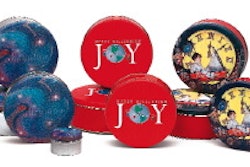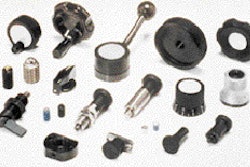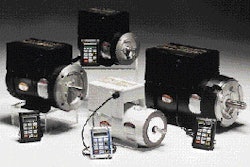In that report, we also provided some comments about the issue from end-users, although their names and companies were not identified. The phone survey, conducted by Frambach & Co. (Elm Grove, WI) early this summer, is confidential. In this report, PW covers the comments from controls makers. A related story (see below) reports on the comments made by packaging machinery builders about Y2K.
Like virtually everyone else, though, controls makers are less assured when it comes to how their products are used in a complete system. "All of our products have been checked," said a representative of a maker of PC-based control hardware. "But we can't guarantee how our components will be used. If they're used on non-compliant equipment, there could be a problem."
A respondent said that some of his company's products could have problems. "Even though the controller will process correctly, customers need to know that their program or software has to be written correctly to handle it. Programming will cause a lot of the Y2K problems," said the spokesman for a Japanese maker of sensors and controls.
Few guarantees offered
The "G" word (for guarantee) was largely avoided by the controls makers. Perhaps the representative of a well-known maker of a full range of controls and other components drew the clearest distinction: "We offer a warranty 'statement of readiness,' not a compliance guarantee," he reported. "Compliance assumes a system level, while readiness means individual components are ready." This firm is depending on its Web site to get the word out, but not exclusively.
"No one has had a problem finding us. Our sales force and other communications channels have been getting the word out. We do provide a service where we'll come out and assess a system for a fee."
A manufacturer of drives and motion controllers admitted some older models are date-sensitive. "We've sent out letters to major customers to notify them of any equipment with date-sensitive functions," said the company expert. "The information is also available to anyone using our Web site." But, he admits, his company can't identify where all these older products may be used.
"We have a unique problem because we also manufacture for a number of companies under private-label arrangements, so another name is on the product, not ours. For these, it's virtually impossible for us to know where these products are" being used.
Another maker of PC-based controls saw the Web site providing two-way communication. His company's Web site contains a questionnaire for inquiries about documentation. "Our site registers the individual or company when it provides documentation so we know who has received it."
Some test programs
Relatively few of the controls makers contacted for this survey indicated they had available either a free testing program or product upgrades. One well-established maker of PC hardware was candid about its system. "We have a program we can ship to customers that will help them test our components. We refer to it in our Y2K documentation," said the company's representative.
"After all, we have some products up to 15 years old that were designed long before anyone thought of Y2K. These will need to be evaluated and probably upgraded."
A manufacturer of drives and motion controllers has a similar procedure, said the spokesman. "Our products with visual displays occasionally have been a problem, but we have patches available. Our Web site is set up to provide information, and training is available for making upgrades. Costs are also included. Some solutions or upgrades can be downloaded free from the Web site."
Some also said the controls will perform as expected, even though the date on the display will be wrong. "A critical issue for customers is to understand that our control will work fine, but it will display double-zero digits. The controller will function fine because it understands that represents the year 2000." But programming should be checked carefully, reported this participant from a large maker of controls and sensors.
A maker of drives and controllers echoed that viewpoint. "It's really a matter of educating the customer to recognize a different display of the date code. There's no need to replace it--just to understand the display of the code might be different" from what they may expect.
Customer concern varies
When asked about the degree of customer concern about Y2K, the answers were inexplicably varied.
After whimsically explaining that his company's products "are as compliant as staplers," one maker of motion controllers said his company has seen major interest. "The concern has been huge. Mainly, we've heard from the OEMs [packaging machinery builders], but from some end-users as well. We're getting a lot of hits on our Web site, and we've been getting lots of requests for documentation."
A manufacturer of machine vision systems also recognizes the issue's interest. "Our customers are very concerned. We have a lot of Y2K requests, and these customers want written documentation that our products are compliant. Since some products are sold through distributors, we're also getting documentation requests via our distributors.
"The other trend we're seeing," the vision system spokesperson added, "is that a number of third-party consulting groups are now asking for the documentation for their end-user clients."
Others reported low levels of customer concern over Y2K. "Most customers I've dealt with are relatively unconcerned," said the representative of a maker of motion controllers. "They tell us they're very confident." That sentiment was reinforced by a Japanese maker of controls and sensors. "By and large, our customers aren't overly concerned, though some are very concerned."
A Japanese maker of drives has experienced a lot of requests for documentation, but its spokesman believes it's mostly to have the necessary paperwork. "Our customers recognize there are no date clocks in our controls, but they seem to want to get their records straight. We've probably sent out 600 letters of compliance," he said.
He also understands that some banks "are requiring that their packaging machinery customers have compliance letters on file, as a condition for continuing loans or credit lines."
It's obvious this spokesman regards packaging machinery makers as his company's prime customers, and others probably do, as well.
Yet other comments about "customers" seem to have been directed more toward end-users. So when asked about "customer concern," it's possible that survey participants were describing two different groups. However, regardless of group, Y2K has been, and is still being taken very seriously by these controls makers. And the survey strongly indicates that remedial information is available to all--especially those with Internet access.


























